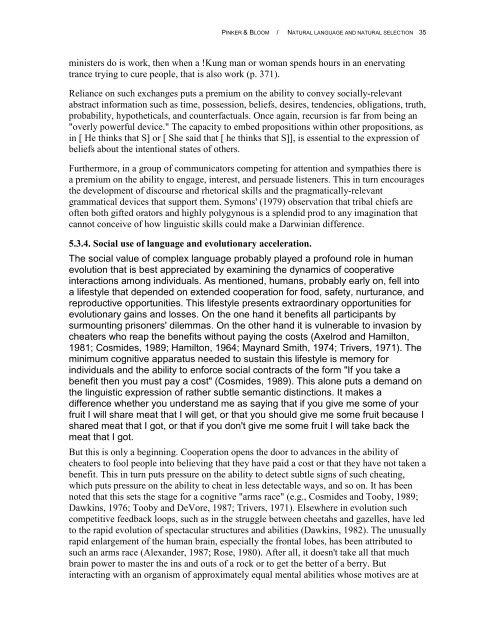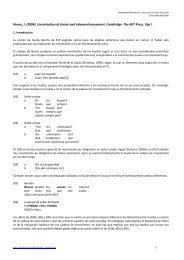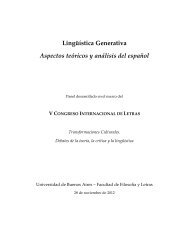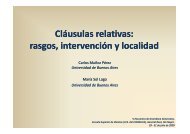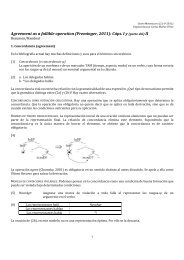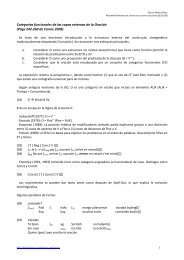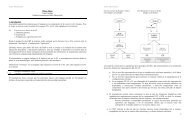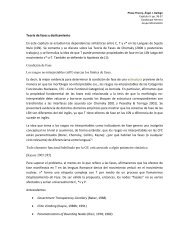Pinker - Bloom - NATURAL LANGUAGE AND NATURAL SELECTION
Pinker - Bloom - NATURAL LANGUAGE AND NATURAL SELECTION
Pinker - Bloom - NATURAL LANGUAGE AND NATURAL SELECTION
Create successful ePaper yourself
Turn your PDF publications into a flip-book with our unique Google optimized e-Paper software.
PINKER & BLOOM / <strong>NATURAL</strong> <strong>LANGUAGE</strong> <strong>AND</strong> <strong>NATURAL</strong> <strong>SELECTION</strong> 35<br />
ministers do is work, then when a !Kung man or woman spends hours in an enervating<br />
trance trying to cure people, that is also work (p. 371).<br />
Reliance on such exchanges puts a premium on the ability to convey socially-relevant<br />
abstract information such as time, possession, beliefs, desires, tendencies, obligations, truth,<br />
probability, hypotheticals, and counterfactuals. Once again, recursion is far from being an<br />
"overly powerful device." The capacity to embed propositions within other propositions, as<br />
in [ He thinks that S] or [ She said that [ he thinks that S]], is essential to the expression of<br />
beliefs about the intentional states of others.<br />
Furthermore, in a group of communicators competing for attention and sympathies there is<br />
a premium on the ability to engage, interest, and persuade listeners. This in turn encourages<br />
the development of discourse and rhetorical skills and the pragmatically-relevant<br />
grammatical devices that support them. Symons' (1979) observation that tribal chiefs are<br />
often both gifted orators and highly polygynous is a splendid prod to any imagination that<br />
cannot conceive of how linguistic skills could make a Darwinian difference.<br />
5.3.4. Social use of language and evolutionary acceleration.<br />
The social value of complex language probably played a profound role in human<br />
evolution that is best appreciated by examining the dynamics of cooperative<br />
interactions among individuals. As mentioned, humans, probably early on, fell into<br />
a lifestyle that depended on extended cooperation for food, safety, nurturance, and<br />
reproductive opportunities. This lifestyle presents extraordinary opportunities for<br />
evolutionary gains and losses. On the one hand it benefits all participants by<br />
surmounting prisoners' dilemmas. On the other hand it is vulnerable to invasion by<br />
cheaters who reap the benefits without paying the costs (Axelrod and Hamilton,<br />
1981; Cosmides, 1989; Hamilton, 1964; Maynard Smith, 1974; Trivers, 1971). The<br />
minimum cognitive apparatus needed to sustain this lifestyle is memory for<br />
individuals and the ability to enforce social contracts of the form "If you take a<br />
benefit then you must pay a cost" (Cosmides, 1989). This alone puts a demand on<br />
the linguistic expression of rather subtle semantic distinctions. It makes a<br />
difference whether you understand me as saying that if you give me some of your<br />
fruit I will share meat that I will get, or that you should give me some fruit because I<br />
shared meat that I got, or that if you don't give me some fruit I will take back the<br />
meat that I got.<br />
But this is only a beginning. Cooperation opens the door to advances in the ability of<br />
cheaters to fool people into believing that they have paid a cost or that they have not taken a<br />
benefit. This in turn puts pressure on the ability to detect subtle signs of such cheating,<br />
which puts pressure on the ability to cheat in less detectable ways, and so on. It has been<br />
noted that this sets the stage for a cognitive "arms race" (e.g., Cosmides and Tooby, 1989;<br />
Dawkins, 1976; Tooby and DeVore, 1987; Trivers, 1971). Elsewhere in evolution such<br />
competitive feedback loops, such as in the struggle between cheetahs and gazelles, have led<br />
to the rapid evolution of spectacular structures and abilities (Dawkins, 1982). The unusually<br />
rapid enlargement of the human brain, especially the frontal lobes, has been attributed to<br />
such an arms race (Alexander, 1987; Rose, 1980). After all, it doesn't take all that much<br />
brain power to master the ins and outs of a rock or to get the better of a berry. But<br />
interacting with an organism of approximately equal mental abilities whose motives are at


